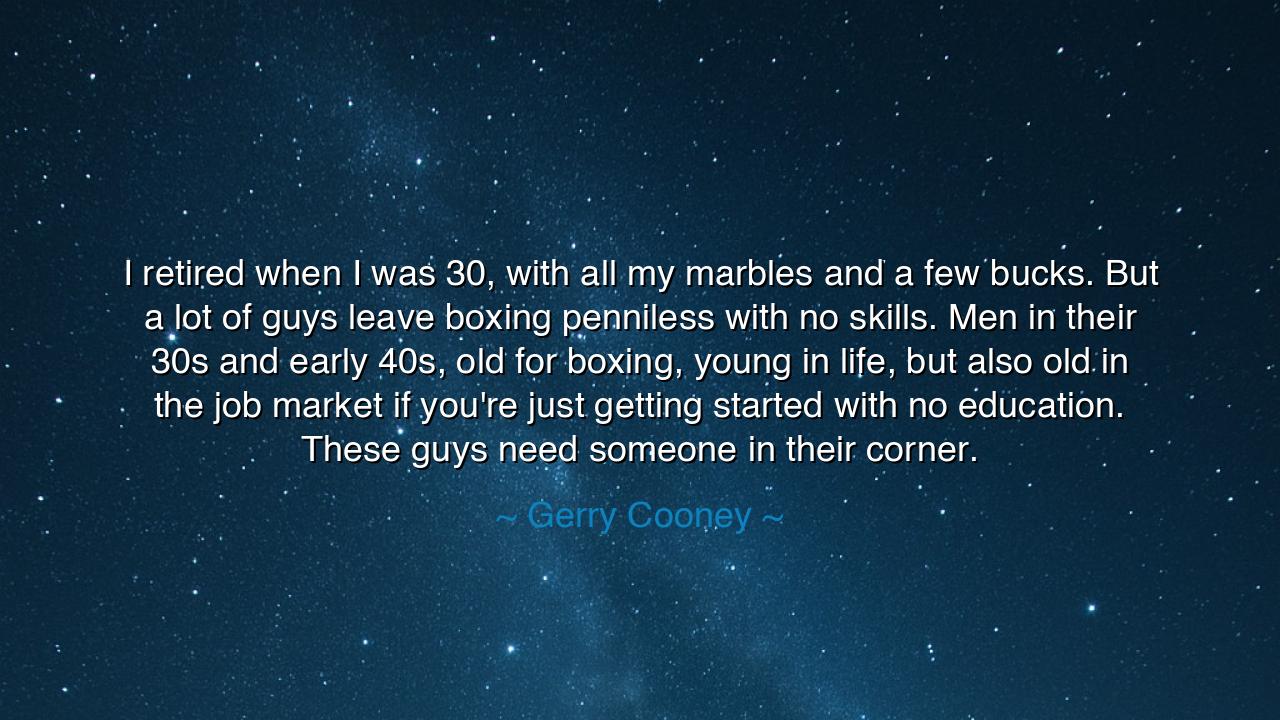
I retired when I was 30, with all my marbles and a few bucks. But
I retired when I was 30, with all my marbles and a few bucks. But a lot of guys leave boxing penniless with no skills. Men in their 30s and early 40s, old for boxing, young in life, but also old in the job market if you're just getting started with no education. These guys need someone in their corner.






Hear now the words of Gerry Cooney, once a mighty warrior of the ring, who spoke with the voice of both triumph and lament: “I retired when I was 30, with all my marbles and a few bucks. But a lot of guys leave boxing penniless with no skills. Men in their 30s and early 40s, old for boxing, young in life, but also old in the job market if you’re just getting started with no education. These guys need someone in their corner.” These are not idle reflections, but the cry of one who has seen the glories and the ruin of the fight. In them lies wisdom not only for boxers, but for all who wrestle with the fleeting nature of strength, fame, and youth.
In the ancient days, athletes of Greece were crowned with olive wreaths, paraded as heroes, their names sung in the marketplaces. Yet once the games were over and their limbs began to fail, many fell into obscurity, some even into poverty. For physical might fades swiftly, and glory alone cannot buy bread. Cooney’s words are but a modern echo of this truth: that those who give their bodies to a craft must think not only of the fight before them, but of the long road beyond. The ring, like life, rewards those who prepare for the years after the cheering stops.
Consider the tragic tale of Joe Louis, the “Brown Bomber,” who reigned as heavyweight champion of the world and brought hope to millions during his time. Yet when the lights dimmed and his career ended, Louis was burdened by debt and forced to take small jobs far beneath his dignity. His fists, once weapons of awe, could not shield him from poverty. He, too, needed someone in his corner, but the world is often harsh to those who have given it their all and have nothing left to bargain with. Cooney’s lament speaks directly to such stories: men who were lions in youth, but lambs in old age, unprepared for the new fight called survival.
The job market, unlike the ring, shows no mercy to those who enter late. A man of 35, who has spent his life in combat, finds himself a stranger in offices and trades where others have been trained since youth. To be young in years but old in opportunity is a cruel paradox, one that many fighters—and indeed many laborers, artists, and dreamers—face when they discover that passion alone does not guarantee livelihood. Cooney’s words shine a light on this peril, a warning to all who give themselves to a single pursuit without planning for the day that pursuit ends.
Yet his message is not only warning, but also compassion. “These guys need someone in their corner,” he says, borrowing the language of the ring to speak of life itself. For just as a boxer cannot face twelve rounds alone—needing trainers, healers, and encouragers—so too do men need guidance when the fight of their career ends and the new battle of survival begins. Cooney’s plea is for society, for communities, for leaders to step into that role: to train the fighters for life after fighting, to give them skills, direction, and dignity when the crowd’s roar fades.
From this teaching emerges a lesson for us all: never put your trust solely in what is temporary—whether it be strength, beauty, or applause. These fade like morning mist. Instead, cultivate skills, friendships, wisdom, and knowledge that endure when the body weakens and the world forgets. Do not wait until the ring grows silent; prepare today for the battles of tomorrow. Invest in learning, build a trade, and seek mentors who will stand in your corner when life delivers its blows.
And so, O listener, take this as a call both to vigilance and to compassion. Be vigilant for yourself: do not waste your youth without thought for age. And be compassionate to others: lend your strength, your counsel, your resources to those who stumble when their first career ends. For in life, as in boxing, victory is not won alone. We all need someone in our corner, and the truest champions are not those who win a single fight, but those who help others rise when the world has knocked them down.
Thus Gerry Cooney’s words must be preserved as both warning and encouragement. They remind us that the fight of life is long, that strength fades, but that brotherhood endures. Let us, therefore, be ready fighters not only in the ring of our craft, but in the larger arena of existence—standing firm, preparing wisely, and ever ready to be in another’s corner.






AAdministratorAdministrator
Welcome, honored guests. Please leave a comment, we will respond soon